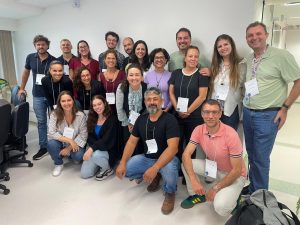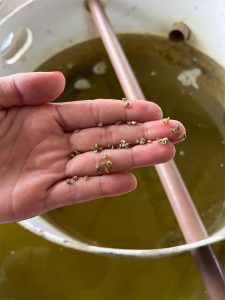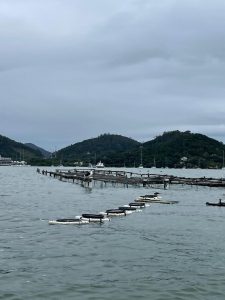UFSC’s 65th Anniversary: Reasons why UFSC is a source of pride for Santa Catarina and a national heritage
 The Universidade Federal de Santa Catarina (UFSC) celebrated its 65th anniversary on 18 December 2024. Throughout this time, there have been ample reasons to consider UFSC one of the most important universities in the country, featured in various national and international rankings.
The Universidade Federal de Santa Catarina (UFSC) celebrated its 65th anniversary on 18 December 2024. Throughout this time, there have been ample reasons to consider UFSC one of the most important universities in the country, featured in various national and international rankings.
The impact of UFSC transcends state borders, achieving national recognition. With excellence in teaching, research, and outreach, the institution has become a collective asset of the Brazilian people – a true public heritage that preserves and promotes knowledge, diversity, inclusion, and sustainable development.
To learn more about the history of UFSC, follow the University’s timeline (in Portuguese).
Below, we list the reasons why we are “a source of pride for Santa Catarina and a national heritage”, the theme of our anniversary celebration.

Out of their shells, on plates all over Brazil: the oysters that reach your table, wherever you are in the country, probably came from the Marine Molluscs Laboratory (LMM) at UFSC, in Florianópolis. That is because the LMM is a pioneer in the field and responsible for almost 100% of the state’s oyster production – Santa Catarina is Brazil’s main producer of oysters, scallops, and mussels. Due to its benchmark status, the LLM leads an international network for research on and monitoring of oyster health.

Energy and knowledge: UFSC is a pioneer in green hydrogen research, having installed the state’s first plant to produce the fuel sustainably – using only water and renewable energy. The building, located at the Fotovoltaica/UFSC Solar Energy Research Laboratory at Sapiens Park in Florianópolis, is considered a model, as the installation generates all the energy required and captures all the rainwater needed for green hydrogen production. The project resulted from an investment of R$14 million, bringing together Brazil and Germany in a scientific and technological cooperation effort. The plant received national recognition and won an award for its innovative engineering design. With excellence in research in the field, the University established a partnership with the State Government to investigate the entire hydrogen utilization cycle, inaugurating the Multi-User Laboratory for the Study of Green Hydrogen in 2025. This state-of-the-art infrastructure aims to promote interaction among UFSC research groups, enabling highly complex and impactful projects for the energy sector.

Making a difference in the national economy: UFSC is a hub for innovation and entrepreneurship in the state, and the data prove it. The figures are available on the DNA UFSC Companies dashboard, produced by the University’s Innovation Department (Sinova/UFC). The survey reveals that more than 66,000 members of the university community – including alumni, students, faculty and staff – helped create 107,000 companies nationwide between 1966 and January 2024. The university’s innovation incentive policies, pre-incubation and incubation programs, intellectual property support, laboratories, and innovation hubs are all part of these entrepreneurs’ history.

Brazil’s first digital diploma: before the nationwide implementation of the mandatory digital diploma in July 2025, UFSC stood out as a pioneer in issuing this type of document. On 15 March 2019, the University held its first graduation ceremony with diplomas in digital format, becoming the first institution in the federal higher education system to implement the technology, in accordance with MEC Ordinances No. 330/2018 and No. 554/2019. The innovation was developed by the Computer Security Laboratory (LabSEC) and the Superintendency of Electronic Governance and Information and Communication Technology (SeTIC).

A pioneer in the medicinal cultivation of cannabis: at the end of 2022, the Cannabis Development and Innovation Center (Podican) of the UFSC School of Rural Sciences, on the Curitibanos Campus, obtained a court order from the Federal Court authorizing the cultivation, preparation, production, manufacture, storage, possession, and prescription of Cannabis sativa. As a result, UFSC became the first higher education institution in the country to obtain judicial authorization to produce all necessary inputs for research on the application of cannabis in veterinary medicine. Currently, the University is part of a working group focused on developing a regulatory framework for cannabis research in Brazil.

To infinity and beyond: the Space Systems Research Laboratory (SpaceLab) at UFSC elevates research in the University’s Department of Electrical and Electronic Engineering to another level. Responsible for launching UFSC’s first satellite into space in 2019, the laboratory is currently part of the Catarina Constellation Project, created by the Ministry of Science, Technology and Innovation to build the country’s first national fleet of nanosatellites for territorial monitoring and responses to climate emergencies. The laboratory also plays an important role in the first commercial mission of the Brazilian Air Force (FAB), Spaceward 2025. SpaceLab is responsible for the first commercial satellites launched from Brazil. The satellites are entirely Brazilian-made, as is the antenna, which was designed and tested at SpaceLab. This will be the country’s first in-orbit test of this technology in the country, representing a significant advance for communications systems intended for future satellite constellations.

Birthplace of the sea urchin: the Marine Molluscs Laboratory (LMM), in partnership with the Marine Shrimp Laboratory, places UFSC at the forefront of aquaculture by pioneering the production of sea urchins under controlled conditions. This milestone represents a decisive step toward creating a new production chain in national mariculture, as sea urchins have high market value and are well accepted in gastronomy as well as in the cosmetic, nutraceutical, and pharmaceutical industries.

National digital certificate bears UFSC’s signature: the personal digital certificates from the Public Key Infrastructure for Education and Research (ICPEdu), currently used across all federal educational institutions in Brazil, are based on a model developed and pioneered at UFSC. This technology enables the signing of digital documents and ensures secure logins to websites for the university communities of all federal educational institutions. Furthermore, it generates savings by eliminating the need to print signed documents – shared economy and security, a national asset proudly developed at UFSC.

Shedding light on sustainable transport: the eBus, developed by the Fotovoltaica/UFSC Solar Energy Research Laboratory, was the first bus in the country to operate 100% on electric power generated by solar energy. Inaugurated in 2016, it served as transportation between the UFSC campus in the Trindade neighborhood and Sapiens Park in northern Florianópolis. Between 2017 and 2020, the eBus traveled the equivalent of three times around the world, providing regular and free services to the UFSC community. By combining sustainability and environmental responsibility, the project served as a pilot to demonstrate the viability of electric buses in public transportation. It was also Fotovoltaica – then called Labsolar – that put into operation Brazil’s first architecturally integrated photovoltaic solar generator, in 1997.

All roads lead to innovation: the Transportation and Logistics Laboratory (LabTrans) at UFSC maintains a portfolio of technical cooperation projects recognized nationally and internationally. The Integrated Road Operations System (SIOR), of the National Department of Land Transport (DNIT), is one example; SIOR is responsible for managing and monitoring all federal highways in the country. Internationally, LabTrans is recognized for its work in road safety and has been accredited as a Center of Excellence within the global network of the International Road Assessment Programme (IRAP), aligned with the United Nations. There are only 10 accredited institutions worldwide, and LabTrans is the only certified institution in South America. Currently, the laboratory is producing technical and scientific studies to modernize Santa Catarina’s intercity passenger transport system through a cooperation agreement with the state government. LabTrans also developed the state’s air transport plan. In geoprocessing, the group advances the use of artificial intelligence in monitoring and maintaining the road network.

A blend of research and pioneering spirit: with more than 50 years of activity, the Welding and Mechatronics Institute (Labsolda), linked to the Department of Mechanical Engineering at UFSC, has pioneering spirit in its DNA. In the 1980s, Labsolda provided technical assistance to the National Nuclear Energy Commission (CNEN) for the implementation of welding engineering specialization courses. Years later, the laboratory collaborated with the space industry, welding part of an experimental rocket made by the Aeronautics Technological Center (CTA). Labsolda also provided technical support to two UFSC experiments sent to the Centenary mission, in which Brazilian astronaut Marcos Pontes participated, in 2006. Among the institute’s achievements is the development of a groundbreaking technology for repairing hydraulic turbines, which resulted in UFSC’s first patent in 2007. By 2025, three additional patents had been granted. Labsolda is an international leader in welding equipment and monitoring, and also supports the Brazilian oil industry. To enable more accurate evaluation of welding processes, the laboratory developed a high-speed video production technique that is now an international benchmark.

A pioneering sign: by creating, in 2006, the country’s first undergraduate program in Brazilian Sign Language (Libras), UFSC become a national and international reference in the field of sign language. In partnership with institutions across Brazil, the University has already trained more than a thousand professionals nationwide through distance learning, including teachers, translators, and interpreters. This excellence led UFSC to establish an agreement with the National Institute for Deaf Education (INES) to serve as an in-person learning hub for INES programs offered via Distance Education (EaD). The UFSC program has also served as a setting for the Crisálida series: launched in Netflix in 2021, it became the first bilingual fiction series in Libras and Portuguese to be produced in Brazil. Furthermore, it was at UFSC that the first deaf-blind student in Brazil completed an in-person undergraduate degree. Abdel Azziz Moussa Hassan Daoud graduated in 2014 and currently holds a master’s degree in Bilingual Education from INES.

High level of added research: front-of-package food labels indicating high levels of added sugar, salt, and fat became part of everyday life in Brazil in October 2022. UFSC played a role in this change from the outset through the Research Center for Nutrition in Meal Production (NUPPRE). The University is among the institutions involved in developing the standard, alongside UNICEF, the Pan American Health Organization, and the Ministry of Health, among others. Accurate information is the best product we can consume without moderation.

A benchmark in education: the work to build the National Higher Education Assessment System (Sinaes) involved the active participation of UFSC. Members of the university community contributed directly to drafting the law that created Sinaes, established in 2004. The University also helped design the National Student Performance Exam (ENADE) and the strategy for on-site evaluation of institutions and programs. Sinaes underpins the evaluation framework that supports rankings classifying the country’s leading universities for more than two decades. The knowledge generated at UFSC is a national education asset.

Building Energy Efficiency: The technical basis for the national program for energy efficiency labeling in buildings, applied by Inmetro and the National Program for Energy Efficiency in Buildings (Procel Edifica), originated at UFSC. The Procel seal – widely known for certifying the energy consumption of household appliances – also applied to civil construction, promoting and certifyinh more sustainable buildings based on research from the Laboratory of Energy Efficiency in Buildings (LabEEE /UFSC). But what is the role of the Procel seal in combating the energy crisis on a large scale? Currently, electricity consumption in buildings accounts for nearly 50% of the country’s billed electricity. With renovations that incorporate energy efficiency concepts required for obtaining the Procel seal, this figure can be reduced by half. UFSC already has buildings with the energy conservation label. The expansion of the University’s Department of Civil Engineering received a level A classification (the most efficient) across all three evaluated criteria: building envelope, lighting, and air conditioning. The label was issued by the CERTI Foundation in 2016.

Transmitting knowledge in the health field: the Laboratory of Molecular Biology, Microbiology and Serology (LBMMS/UFSC) is recognized by the Ministry of Health as a national reference in research on Sexually Transmitted Infections (STIs). While leading the Sentinel Surveillance of Gonococcus (SenGono) project – which studies the resistance of gonorrhea-causing bacteria to medications, the laboratory also supports the Ministry of Health in the WHO’s international initiative against STIs, the Enhanced Gonococcal Antimicrobial Surveillance Program.

A bridge to the future: public health and education advance further with the Bridge Laboratory, linked to the School of Health Sciences and the School of Technology at UFSC. The official strategy for computerizing Primary Health Care in Brazil (e-SUS APS) was developed by Bridge in partnership with the Ministry of Health. The laboratory also developed the National Implant Registry (RNI) and the O Brasil Conta Comigo [Brazil Counts on Me] platform, used by Anvisa (the Brazilian Health Regulatory Agency) in combating the coronavirus pandemic. In partnership with the Ministry of Education, the laboratory developed the award-winning Student Journey app and Habilita, a data management and public resource allocation control system for Basic Education. UFSC drives local innovation with national impact.

Telemedicine, we see it here: UFSC is proud to be a pioneer in telemedicine, telehealth, and telecare through the work of the Telemedicine Laboratory (LabTelemed), of the National Institute of Science and Technology for Digital Convergence (INCoD), within the University Hospital. The team created the Integrated Telemedicine and Telehealth System and the first telemedicine network in Santa Catarina. The initiative is considered unprecedented in Brazil, as Santa Catarina was the first state to integrate its Telemedicine Center into a University Telemedicine Network. By 2021, more than 10 million telemedicine exams had been conducted using the system developed by the University. This pioneering effort led UFSC to extend its partnership with the Brazilian Hospital Services Company (Ebserh) to provide the system across the entire network of federal university hospitals.

Life-saving information: for more than 40 years, the Santa Catarina Poison Control Center (CiaTox/SC), located at the University Hospital, has been a reference in the field. Efforts to implement CiaTox/SC began in 1981 through a partnership between the State Health Department (SES), the University Hospital, and the Ministry of Health, via the Oswaldo Cruz Foundation (Fiocruz). According to the center’s data, from its creation through 31 December 2024, it handled 376,596 poisoning cases involving agents such as medications, pesticides, veterinary products, rodenticides, industrial and household chemicals, drugs of abuse, toxic plants, and envenomation by venomous animals. These cases came from all 295 municipalities in Santa Catarina. During this period, CiaTox developed more than 30 research and outreach projects and produced over 500 scientific papers. It is a source of pride to provide such an important service to Santa Catarina for so long!

Guardian of historical heritage: for 46 years, UFSC has managed three centuries-old fortifications that helped shape southern Brazil. On 21 November 1979, the University took over the management of the Santa Cruz de Anhatomirim Fortress, in what is now the municipality of Governador Celso Ramos. The site opened to the public in 1984. Subsequently, the Santo Antônio de Ratones Fortress, in Florianópolis, came under UFSC’s care in 1991 and opened to the public the following year. Finally, the São José da Ponta Grossa Fortress opened to the public in 1992 and has been managed by UFSC since then.

Connection to democracy: did you know that the inventor of the electronic voting machine was a UFSC student? His work enabled Brazil’s first electronic election, held in 1988 in the city of Brusque. UFSC’s connection to innovation in elections continues today: the electronic voting machines used nationwide incorporate technology developed by the CERTI Foundation, which designed the equipment for the company that won the TSE’s international tender.
Translated by SINTER/UFSC.
Read the original article here.





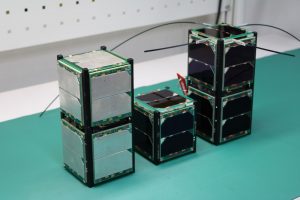

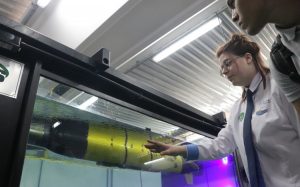
 More than 2,100 institutions evaluated
More than 2,100 institutions evaluated
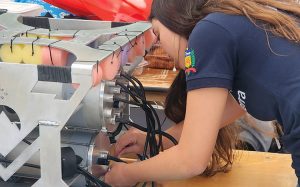
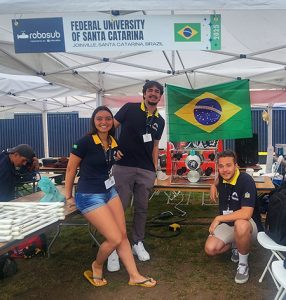
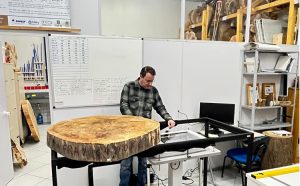
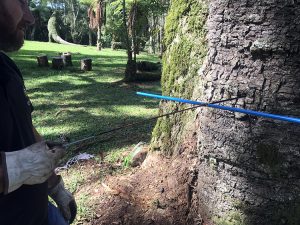
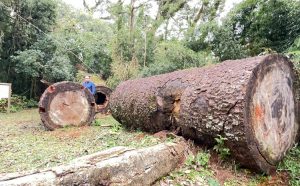
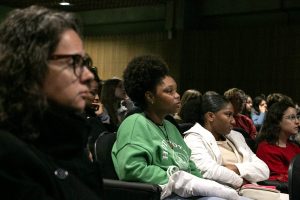
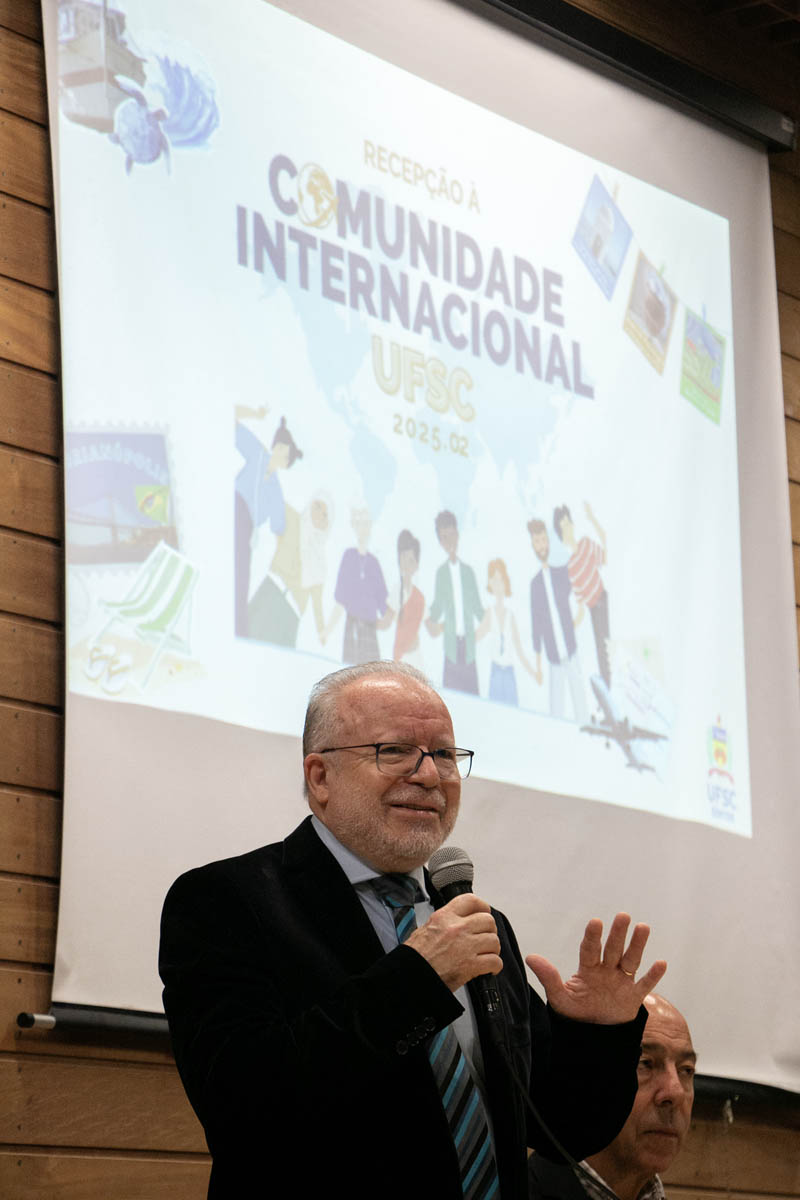
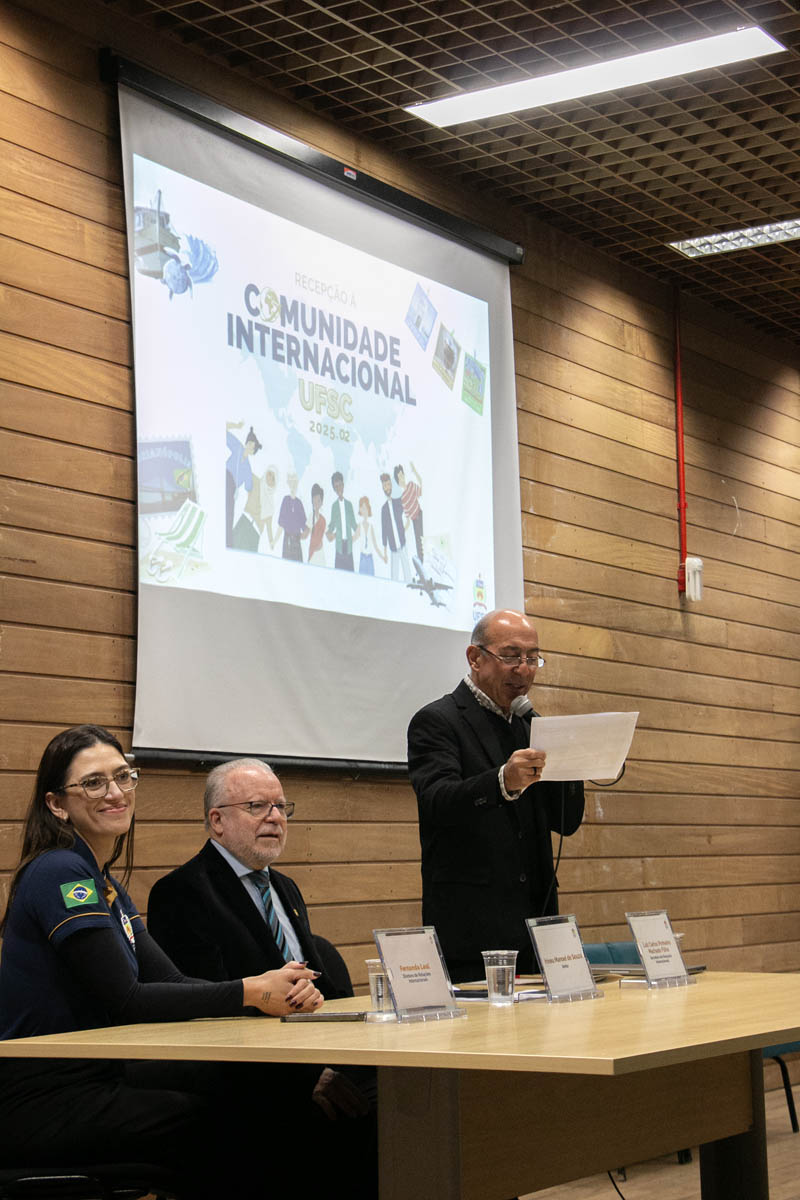








 Four representatives from the Universidade Federal de Santa Catarina (UFSC) will be sworn in as members of the Council for Sustainable Social and Economic Development (CDESS) on 5 August 2025, at the Planalto Palace in Brasília. The Vice-Rector
Four representatives from the Universidade Federal de Santa Catarina (UFSC) will be sworn in as members of the Council for Sustainable Social and Economic Development (CDESS) on 5 August 2025, at the Planalto Palace in Brasília. The Vice-Rector 
